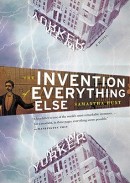Every Thursday on the blog brings a post about a paperback book.
 The Invention of Everything Else
The Invention of Everything Else was one of the best novels published in 2008. Samantha Hunt’s first novel, The Seas, told the stark story of a young woman who believed she was a mermaid. That slender, experimental debut may have given Hunt’s headstrong imagination too free a rein, resulting in some startling moments but an abundance of precious imagery. In Invention, she wrote a sophomore novel that burnished every one of her existing strengths and introduced some new ones.
Any synopsis of Invention makes it sound plenty precious, too, but Hunt’s confident performance quickly overrides any concerns. It’s 1943, and the inventor Nikola Tesla is living out his last days hidden away in the Hotel New Yorker, where he thinks back on his eventful life, stokes resentments, speaks to his pet pigeons and befriends a young maid named Louisa:
I pet one bird to keep the chill from my hands. The skin of my knee is visible through my old suit. I am broke. I have given AC electricity to the world. I have given radar, remote control, and radio to the world, and because I asked for nothing in return, nothing is exactly what I got. And yet Marconi took credit. Marconi surrounded himself with fame, strutting as if he owned the invisible waves circling the globe.
Quite honestly, radio is a nuisance. I know. I’m its father. I never listen to it. The radio is a distraction that keeps one from concentrating.
Among other charms, the novel gives us a deep, lovely and sustained portrait of the planetary hotel, with its indoor skating rink, enormous kitchen, secret rooms and “its own power generator, producing enough energy to support thirty-five thousand people.” The hotel stands not just as a meronym of the entire grand, exploding city, but of all human industry and ambition.
The real-fictional Tesla and the just-fictional Louisa are equally believable, sympathetic characters. And the foundation they provide means that even the book’s most fanciful flights — like the effort to build a time machine — are easily accepted. The dashes of magical realism even feel appropriate, given the surreal advancements that Tesla created and witnessed in his lifetime. (“On December 12, 1901, Marconi sent a message across the sea. [. . .] Imagine, a letter across the ocean without wires.”) Both clever and profound, Hunt’s mixture of history and artistry is worth seeking out if you missed it the first time around.

